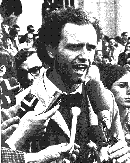 after suffering heart failure. He was 53.
after suffering heart failure. He was 53.
San Francisco Chronicle
Nov. 7, 1996
Steve Rubenstein, Chronicle Staff Writer
Mario Savio, the eloquent, disheveled philosophy student who
climbed atop a police car in 1964 and kicked off the fiery
Free Speech Movement at the University of California at
Berkeley that forever changed campus life in the United
States, died yesterday at a Sebastopol hospital, four days
 after suffering heart failure. He was 53.
after suffering heart failure. He was 53.
Savio, who had a heart condition, died just after 5 p.m. yesterday. He was brought into the hospital in a coma and never regained consciousness.
Savio, a shy man who stuttered before small groups, was riveting and compelling when he spoke to thousands. He came to Berkeley in 1963 because, as he told a friend at the time, ``I'm tired of reading history -- now I want to make it.''
The next year, standing in stocking feet on the hood of the beige police car while surrounded by thousands of students, he did. ``You've got to put your bodies upon the gears and upon the wheels, upon the levers . . . and make it stop,'' he shouted to the crowd, after officers had arrested another protester and placed him in the back seat.
The arrested protester, Savio's 24-year-old friend Jack Weinberg, had violated a campus rule that seems farfetched by today's standards -- a ban against on-campus politics. Weinberg had set up a leafletting table on the plaza on behalf of a civil rights group.
For the next 32 hours, students surrounded the police car and held about 600 officers at bay.
Instantly, Savio became a symbol of the youthful protest of the 1960s. There were more protests that fall, leading to a sit-in by thousands at Sproul Hall in which Savio and 782 followers were arrested. While Joan Baez sang, Alameda County deputy district attorney Edwin Meese, who would later become U.S. attorney general under President Ronald Reagan, led police inside.
Days later, the Board of Regents voted to drop university restrictions on speech.
``This free speech fight points up a fascinating aspect of contemporary campus life,'' Savio said at the time. ``Students are permitted to talk all they want, so long as their speech has no consequence.''
Eventually, Savio served a four-month sentence at Santa Rita Jail for his part in the sit-in. He also served an additional two-day jail term for contempt of court after mouthing off to a furious judge about the ``shameless hypocrisy'' of his trial.
Savio, the son of a machinist, grew up in Queens, N.Y., collected stamps and, as a high school honors student, performed science experiments on the conductivity of sea water.
He spent a summer as a volunteer in an impoverished community in Mexico and helped register black voters in Mississippi. He found the study of physics ``too easy'' and switched to philosophy at Queens College before coming to Berkeley.
``He had poise, presence and a sense of drama, and that rare personal gift, commonly found among good actors and politicians, of being able to utter the grossest vapidities and leave his audience feeling that it has listened to deep stuff,'' said writer Russell Baker.
In 1965, Savio announced his ``retirement'' from the Free Speech Movement. For the next 31 years, he would duck in and out of the public eye, eager to be heard but reluctant to be a symbol of nostalgia.
He earned bachelor's and master's degrees in physics from San Francisco State University, suffered periodic bouts of depression and worked at bookstores. For the past three years, he taught mathematics at Sonoma State University and led protests against higher student fees.
In a 1984 reunion at Berkeley, Savio recalled that the 1964 protests had been a ``brilliant moment when we were both moral and successful.''
Last year, Savio stood on a flatbed truck outside a meeting of the Board of Regents in San Francisco at a rally in support of affirmative action. His hair was gray, but his voice had lost none of his power as he called for protesters to remain ``massive and strong in the streets, over and over and over again.''
He is survived by his wife, Lynne Hollander, and his sons, Stefan, who lives in Vermont, Nadav of San Francisco and Daniel of Sebastopol; his father, Joseph, of Covina, and his brother, Tom, of Pasadena.
A memorial is planned in Berkeley on December 8, his birthday and the anniversary of the 1964 UC Academic Senate resolutions that affirmed the right of students to participate in political activity.
Contributions are requested for the Savio Family Fund, c/o ILE, Sonoma State University, Rohnert Park 94928, or to the Scholarship Fund of Camp Winnarainbow, 1301 Henry St., Berkeley 94709.
Document URL:
http://www.writing.upenn.edu/~afilreis/50s/savio-sf-obit.html
Last
modified: Thursday, 31-May-2007 09:41:50 EDT